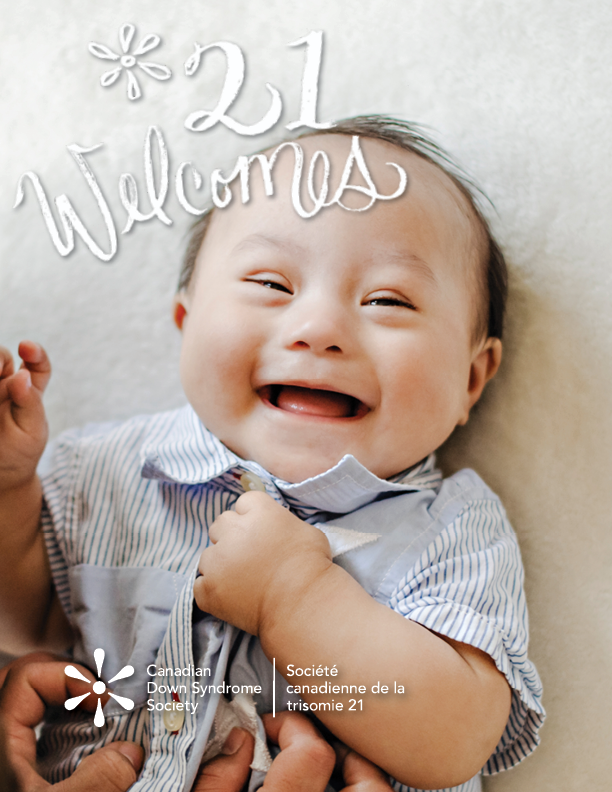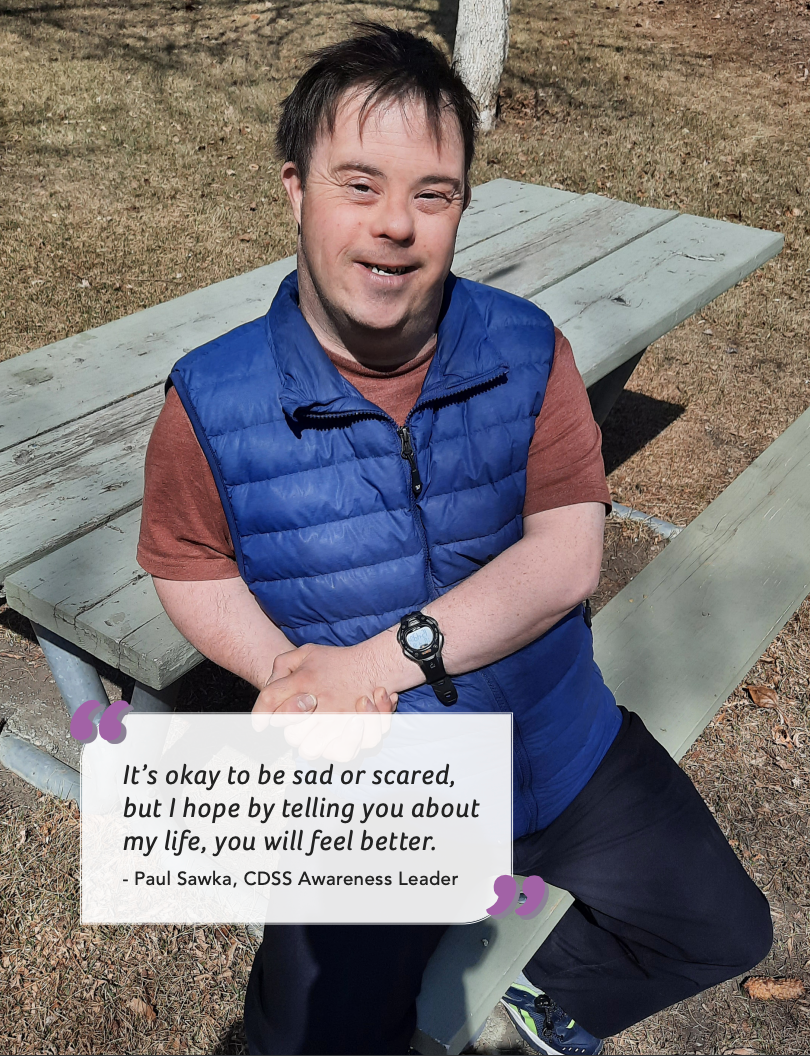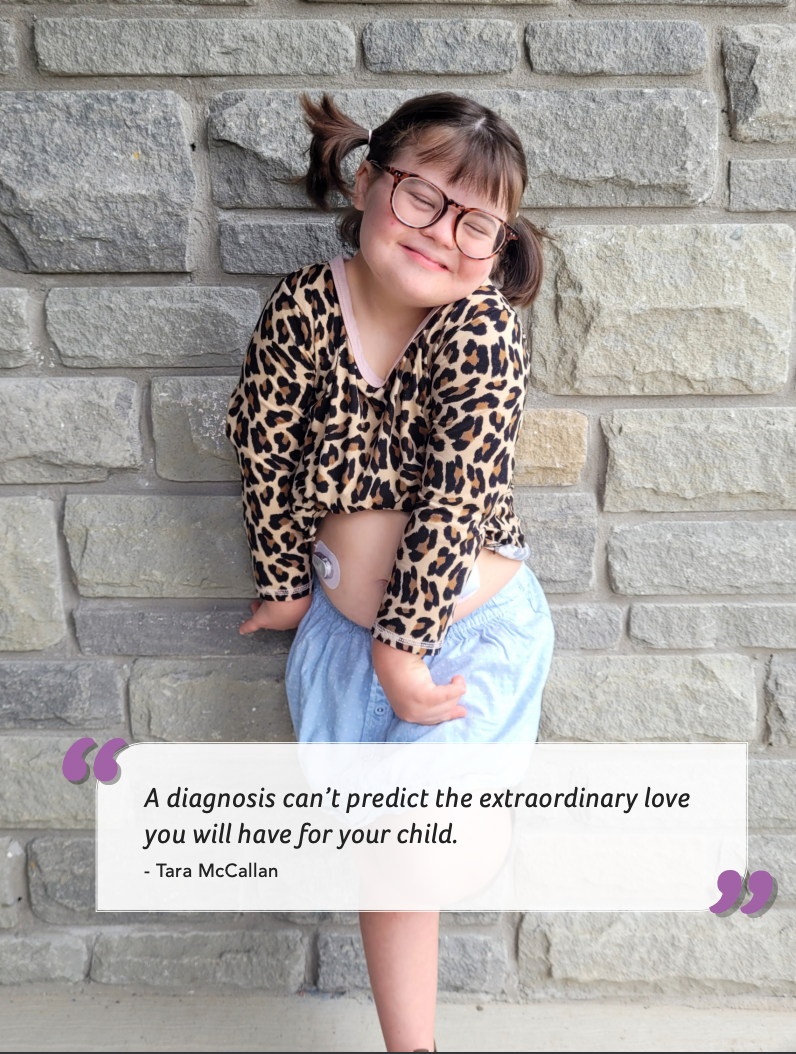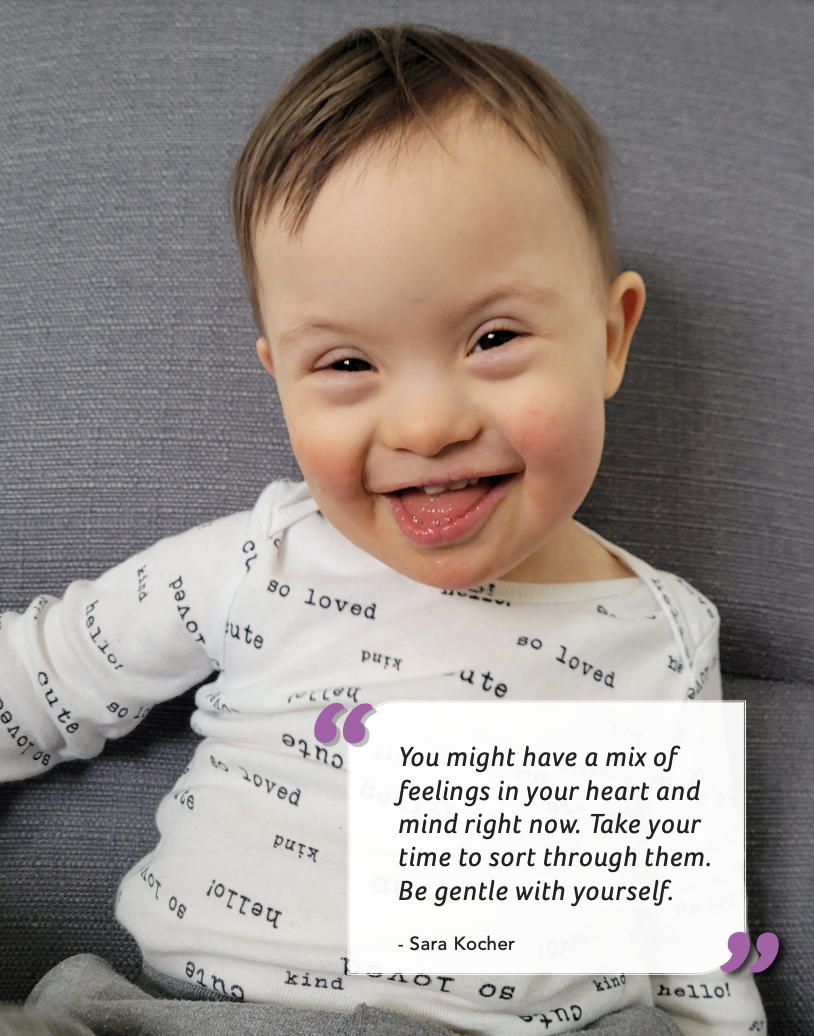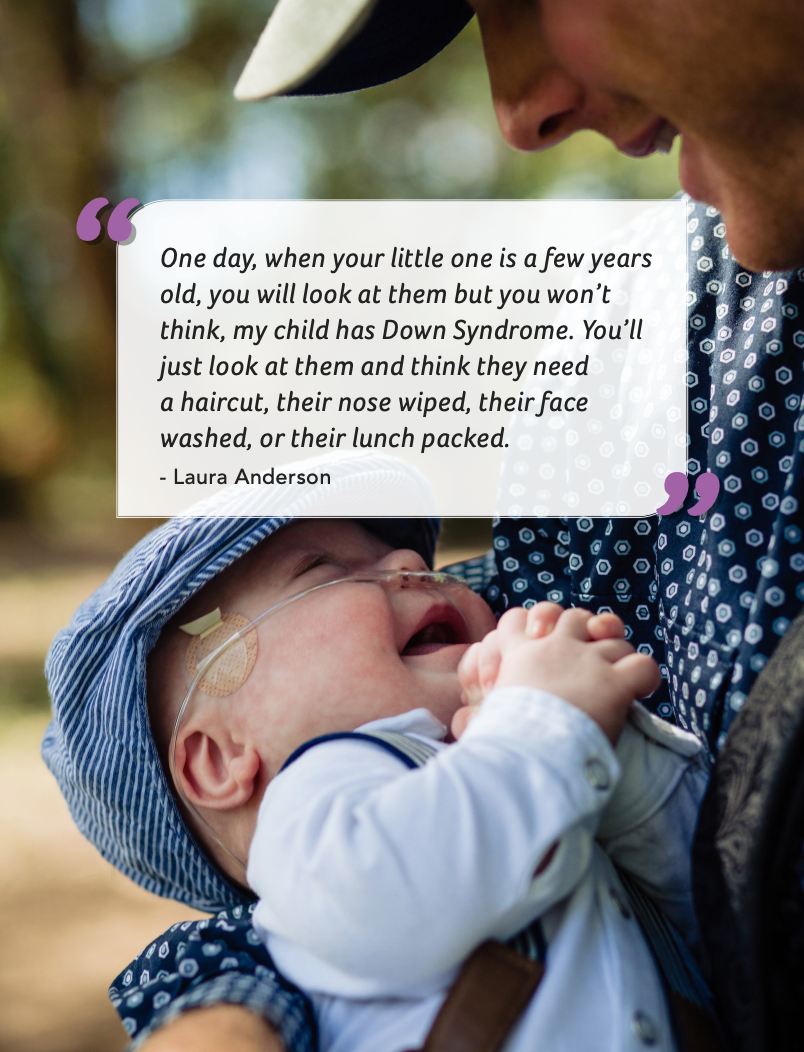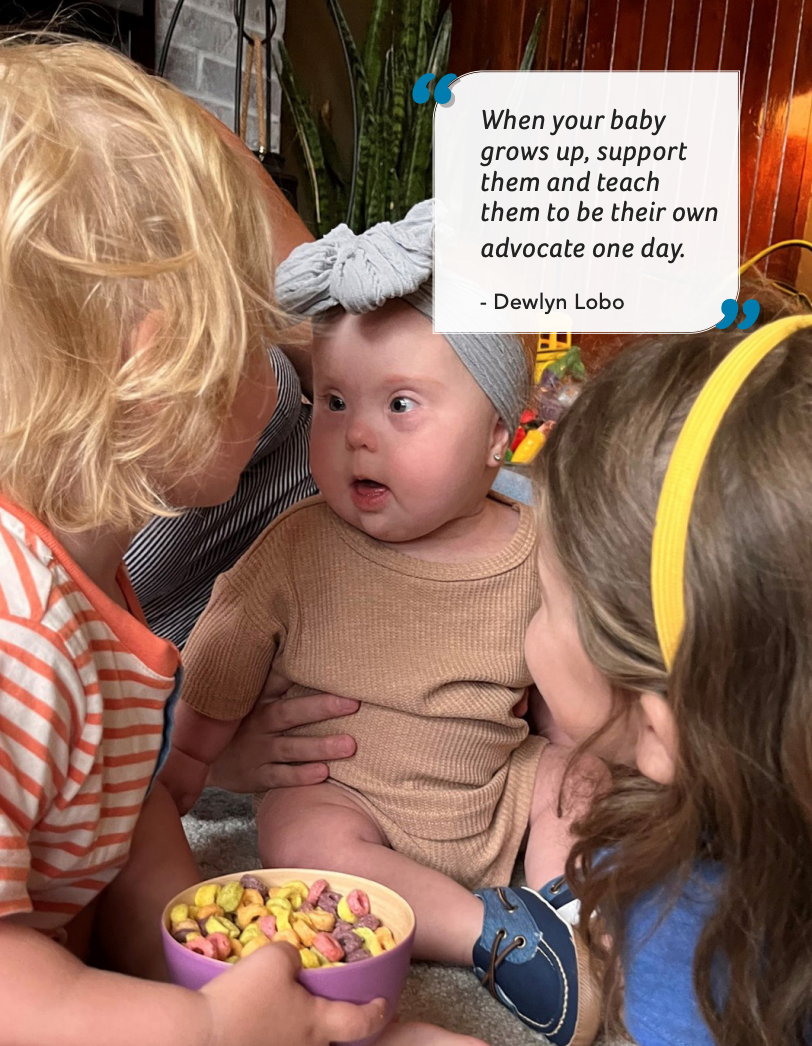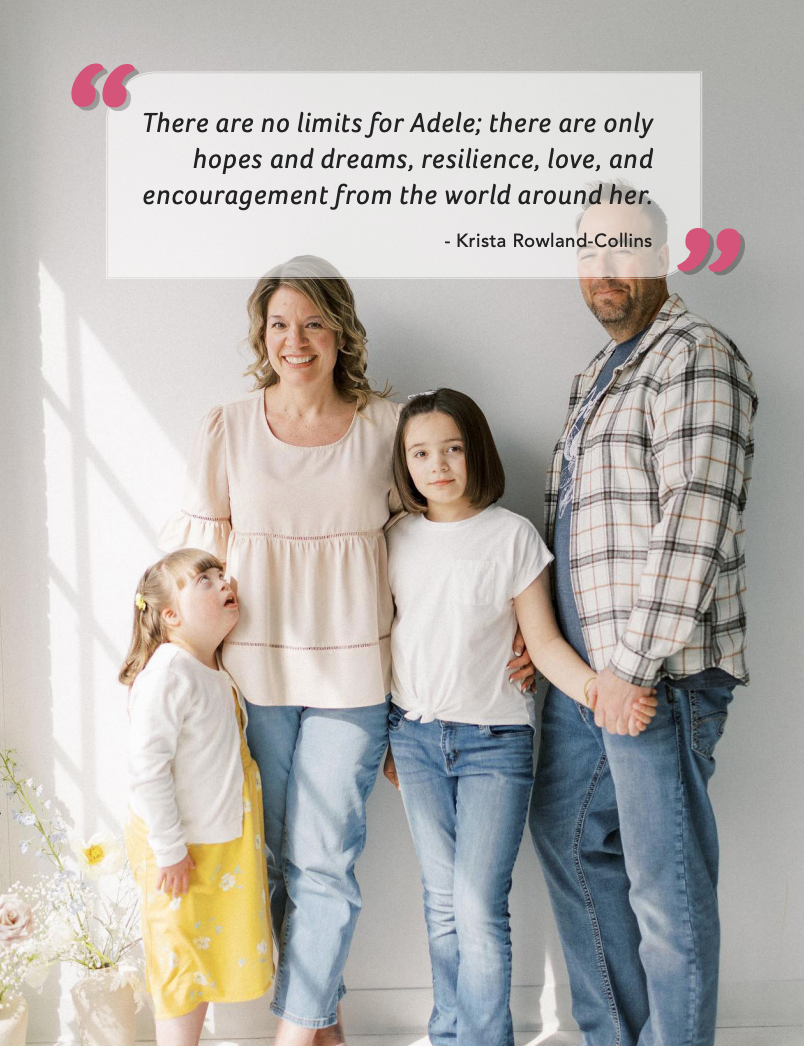New Parents and Early Years

Welcome to the Down Syndrome Community
Congratulations on your new baby! Having a new baby is exciting, but it can also be overwhelming to find out you have a baby with Down syndrome. The following resources will help to provide you with honest parent perspectives, encouragement, and valuable information during the early days and years of welcoming a baby with Down syndrome.
21 Welcomes: A Guide for New Parents
21 Welcomes is Canada’s guide for new parents who are expecting or just had a baby with Down syndrome. This booklet will support you through the beginning of your journey into the Down syndrome community with stories from other parents, messages about what it’s like to live with Down syndrome in Canada, and essential information about feeding, early interventions, and more. 21 Welcomes will also help you share the news with your friends and family and educate them about what it is like to love a person with Down syndrome. Download your copy for free.



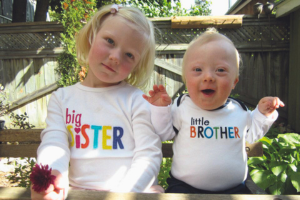
Dear New Parents
“Congratulations on the birth of your baby! My name is Paul and I have Down syndrome and I am the Awareness Leader at CDSS. I have a great life and I feel very proud of it.
It is important as a parent to have high expectations and to give lots of support to your child. When I was young, I played sports and went to school. After high school, I went to Mount Royal University and Columbia College. I did learn many important skills that helped me get many different jobs. I was also valedictorian.
I live in an apartment with a supportive roommate. I have some help, but I’m able to do lots of things on my own. Having Down syndrome did not stop me from doing all the things I have wanted to do. If you have any questions about people with Down syndrome, please check out my blog.
All the best,
Paul Sawka
Important Information for New Parents
As a new parent, you probably have many questions about how to best care for your baby with Down syndrome. Below you’ll find information about adjusting to the diagnosis, sharing the news with friends and family, feeding your baby, early interventions, and more. Detailed versions of this information can be found in 21 Welcomes.
Adjusting
You have just had a new baby and that is something to celebrate! Your newborn needs to be loved like any baby does. After finding out your new baby has Down syndrome, you may be feeling many emotions at once. This is normal. There is no right or wrong way to feel. Receiving the news can be shocking. It may take time to adjust to having a child with Down syndrome. This is okay. Your journey will be unique to you. All parents have different feelings when they find out they have a child with Down syndrome. Some parents feel happy and excited about the birth of their baby, while some experience feelings of shock, sadness, guilt, or disappointment. Many feel a lot of uncertainty and doubt regarding their child’s future. You should know that there is absolutely nothing that you did to cause your child to have Down syndrome.
Sharing the News
After learning your baby has Down syndrome, one of the hardest things can be telling your friends and family. You may still be adjusting. You may be worried about how others are going to react to the news. It is normal to feel nervous about telling your friends and family. You might get mixed responses from them. Many will be in shock and will grieve the same way you did. Tell them that this new baby is something to be excited about and to celebrate. It is important to remind your friends and family about the joy of having a new child.
It can be difficult to know what to say or do when you learn that someone you know is expecting or just recently had a baby with Down syndrome. We asked Canadians with Down syndrome what they think people should say to new parents…
Find more information on sharing the news in 21 Welcomes.
Feeding Your Baby
The early days of feeding are a time for you and your baby to get to know each other and create a special bond. You must make some adjustments during this time because every baby is unique. As you get acquainted, you will discover that babies with Down syndrome have physical characteristics that may have an impact on feeding. You probably will not encounter every challenge, but understanding your baby’s particular needs will help you to get feeding off to a good start.
Contrary to misconception, babies with Down syndrome can and do breastfeed. Keep in mind, no matter the feeding method you choose, it often takes time and patience to make sure your baby is feeding well. In the early days, you may need information, support, and/or practical interventions from a feeding specialist. The most important thing is that you find a way that works best for you and your baby. For some mothers, breastfeeding simply doesn’t work out – and that’s okay. Your healthcare provider or doctor can provide information on all feeding options.
Breastfeeding
POSITIONING
When breastfeeding, many mothers find the laid-back position helpful in getting a deep latch with no nipple pain. This position is especially helpful in the early days or weeks after the birth. To use this position:
- Place your baby on your bare chest.
- Use pillows to support yourself as you lean back at about a 45-degree angle.
- Your body supports your baby; the prone position helps babies open their mouths wide.
Positioning your baby in a comfortable and supportive arrangement will preserve their energy and allow them to use this energy for feeding.
LATCHING ON
Express some milk onto your nipple prior to breastfeeding. This may encourage your baby to latch on. Also ensure your baby gets a large mouthful of breast tissue. This will help your baby draw the milk out and stimulate the breasts to produce more.
SIGNS OF MILK TRANSFER
If your baby is latched on deeply and sucking steadily, they will drink lots of milk. The following signs help you know your baby is drinking well.
- Your baby is sucking with a steady rhythm and few pauses.
- You can hear swallowing.
- You are not experiencing nipple pain.
- Your breast feels softer after your baby feeds.
- Your baby has 6-8 wet diapers and 2-5 stools every 24 hours.
- Your baby is gaining weight.
BREAST COMPRESSION AND SWITCH NURSING
Breast compression is done when your baby is breastfeeding but sleepy or not actively sucking. Use one hand to squeeze the breast firmly but not so hard that it hurts. Your baby should start to swallow. Keep squeezing until your baby stops or slows down their sucking again. When you release the pressure, your baby will increase swallowing; once it slows down, squeeze again. Repeat the squeezing and releasing until it no longer works, and then offer your baby the other breast.
To try switch nursing, watch for your baby to lose interest in active suckling, then slip a finger in the corner of their mouth to break the suction and offer the other breast; your baby should nurse more vigorously. When their sucking slows again, switch him back. Keep repeating this until they seem satisfied. You can combine breast compression and switch nursing or do just one or the other. You will see what works best for your baby.
If there are challenges, you may need information, support, and/or practical interventions to reach your goal. IBCLCs (International Board Certified Lactation Consultants) can assist with latching and milk supply issues. You can also find support through La Leche League, a mother-to-mother support group of volunteers that provide breastfeeding support online, over the phone, and in person.
Early Intervention Programs
Early intervention programs are available for children from birth through to about five years old. Through these programs, early childhood specialists provide families with support and ideas for activities that will be beneficial to their child’s development. It is important to start early intervention programs as soon as possible, especially for children with Down syndrome.
Common early intervention programs for children with Down syndrome are physical therapy (PT), speech-language pathology (SLP), and occupational therapy (OT). During early interventions, professionals will observe your child’s gross and fine motor abilities, language skills, social development, and self-help skills, and will then develop focused activities specific to your child. This will allow for your child’s individual skills to be developed and strengthened.
Siblings
After giving birth to a baby with Down syndrome, many parents are worried about how it will affect their other children. This is understandable. The good news is that a study done by Dr. Skotko and his colleagues found that an overwhelming majority of parents feel that their children with Down syndrome have a good relationship with their siblings. They also found that 94% of older siblings to a child with Down syndrome are proud of their brother or sister.
The vast majority of people describe their relationship with their sibling with Down syndrome as positive and enriching; some even say their sibling is the best thing that ever happened to them. It is important to keep in mind that your children will have their own unique journey, full of the typical friction, learning, and love that embodies sibling relationships.
Family
Having a child with Down syndrome will affect everyone in your family: parents, siblings, grandparents, and extended family. Everyone processes information differently; allow time for every family member to adjust. By supporting family members in learning and understanding Down syndrome, you will help them learn about your new family member and all the possibilities that the future holds for them. Together you and your family can support each other, and a great place to start is sharing this booklet with them so they can learn with you.
Additional Resources for New Parents
Down Syndrome Pregnancy Books
Guide pour Nouveaux Parents, Regroupement pour la Trisomie 21 RT21
National Down Syndrome Congress
Personal Child Health Record (PCHR)
The fifth edition of the Personal Child Health Record from The Down Syndrome Medical Interest Group was released in 2020. It contains updated information for parents and professionals to help them maintain the health and well-being of babies born with Down syndrome, including expected developmental progress and advice about feeding and growth.
Support for Breastfeeding
La Leche League supports new mothers as they learn to breastfeed effectively. Their volunteers assist in person, over the phone, online, and in informal group meetings by providing evidence-based information on breastfeeding and human milk. They live and parent in the communities they serve and tailor programs to the needs of each community.
Adele’s Over the Rainbow Baskets
Adele’s Over the Rainbow Baskets delivers Welcome Baskets to new parents who’ve just had a baby with Down syndrome in the Calgary and Red Deer area in Alberta. They aim to raise awareness and provide families with comfort and joy as they celebrate their new baby. The baskets are lovingly filled with beautiful gifts, a list of resources, and a photo shoot. You can find different Welcome Basket programs across Canada, search in your area!
Baskets of Love
Baskets of Love Down Syndrome Support Society is another Welcome Basket program for new parents of a child with Down syndrome in British Columbia and across Canada. Each Basket of Love includes information about local and national resources that can help a new family transition more easily and more positively into life with Down syndrome.



Understanding Down Syndrome: 1st Year
Dr. Brian Skotko is a Board-certified medical geneticist and Co-Director of the Down Syndrome Program at Massachusetts General Hospital. In this video, he reviews the important facts parents should know in the first year with their baby.


